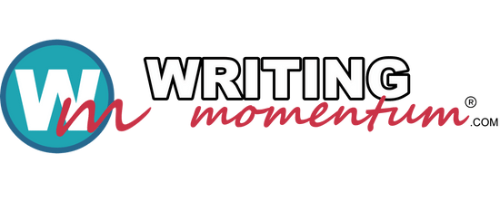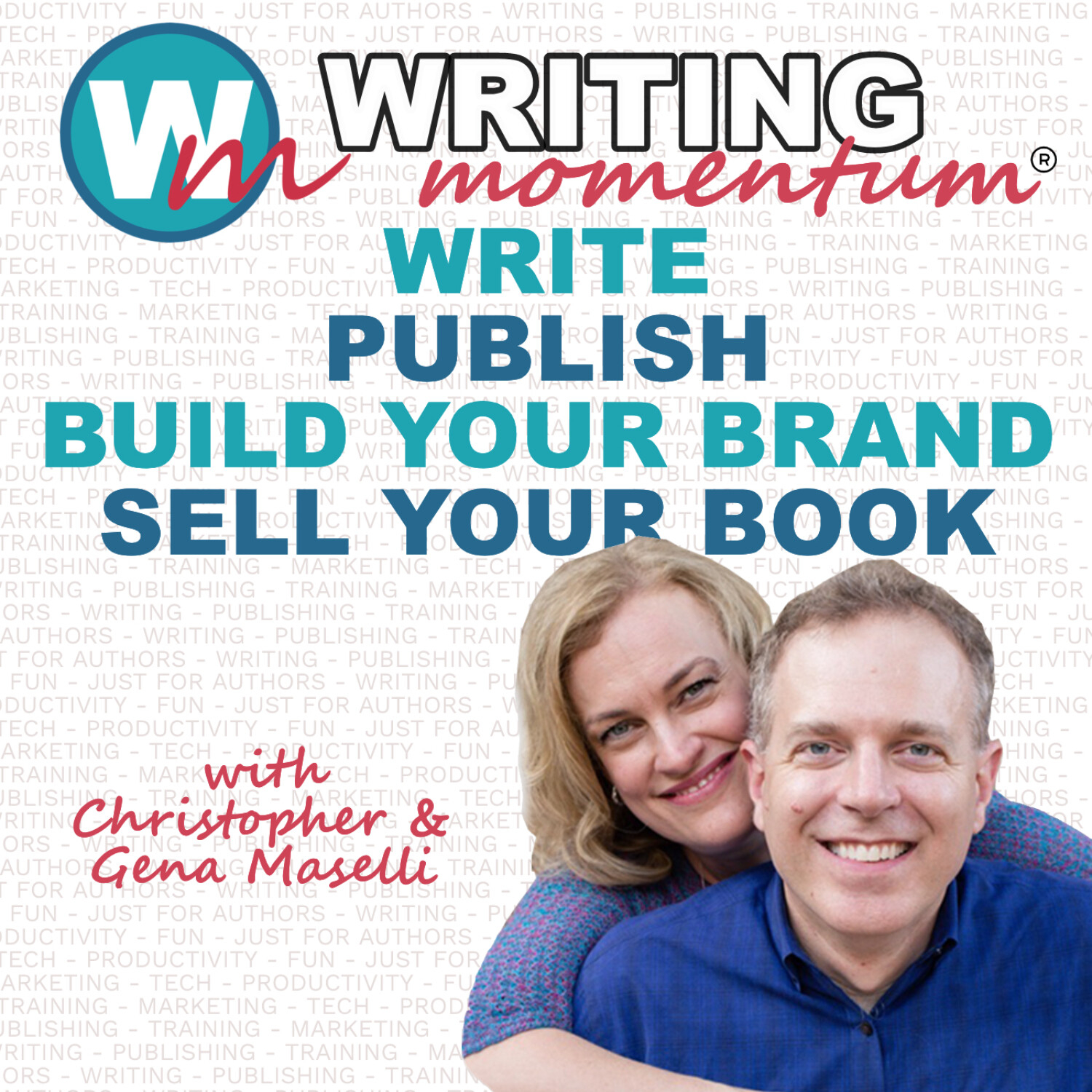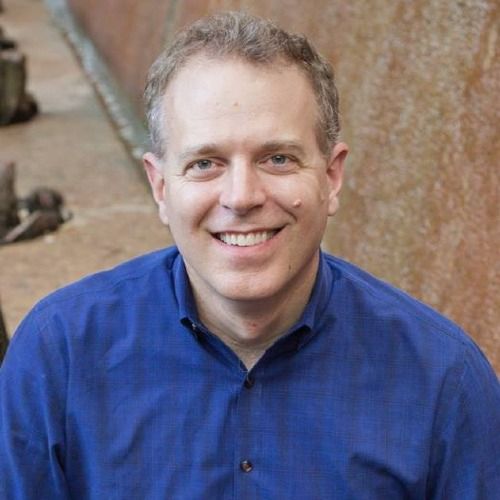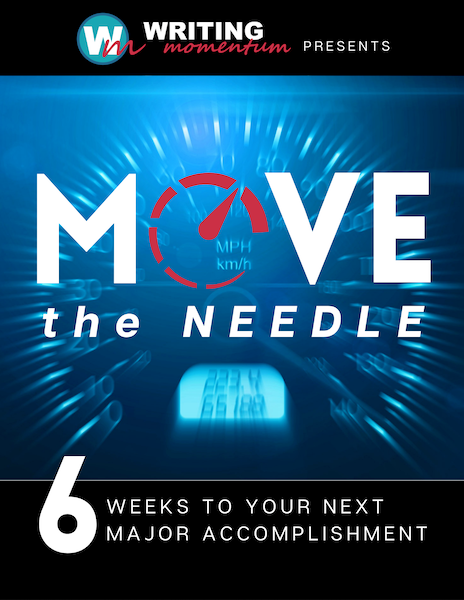Episode 114
Just Finish Your First Draft
In this episode of the Writing Momentum podcast, hosts Christopher and Gena Maselli discuss strategies for finishing first drafts, acknowledging it as a significant challenge for many writers. They emphasize the importance of completing a draft regardless of its initial quality and suggest focusing on editing afterward to improve it. The hosts share personal experiences, tips for maintaining momentum, including setting writing goals and knowing the direction of your story, whether you're more of a plotter or a pantser. Additionally, they introduce their Wednesday Writing Moments, an online group writing session for accountability and progress. The discussion aims to encourage writers to keep working towards completing their first drafts by providing practical advice and shared experiences.
00:00 Kickstarting Your First Draft: Overcoming the Pain Points
02:50 The Simple, Yet Profound Solution to Finishing Your Draft
03:20 Editing vs. Writing: The Easier Path to a Finished Book
07:04 Setting Goals: The Key to Maintaining Writing Momentum
08:53 Plotting vs. Pantsing: Finding Your Writing Style
13:18 The Power of Writing Together: Accountability and Progress
15:36 Closing Thoughts: Just Write It
LINKS:
- Liz Wilcox's Email Marketing Membership at http://wmdeal.com/liz
- Get your FREE Move the Needle goal-setting for authors ebook at https://www.writingmomentum.com
- Write with us! Join Chris, Gena, and Rene each Wednesday at noon Central and let's get our writing DONE! https://www.writingmoments.com
Transcript
How do you finish your first draft when it just doesn't seem to be coming together?
Speaker:We can help with that.
Speaker:Hello and welcome to the Writing Momentum podcast.
Speaker:I'm Christopher Maselli.
Speaker:I'm here with my wife, Gena.
Speaker:Hello.
Speaker:So good to see everybody.
Speaker:Hey, today we're talking about finishing first drafts.
Speaker:Oh yeah.
Speaker:This is a big pain point, isn't it?
Speaker:It's a total pain point, yes.
Speaker:But, you know, finishing first draft is something that's It's of course
Speaker:important to do if you want to be a writer, you gotta get your first draft
Speaker:done, but I think this may be one of the hardest parts of book writing.
Speaker:I, I would totally agree with that.
Speaker:I'm actually working on a project right now, and it has, it's gotten to that
Speaker:place where it is just like, it's putting those final kind of seams in pulling the
Speaker:whole thing together and it can be tough.
Speaker:I think it's harder than you know, you start out with your book and
Speaker:you're super excited to be there and you're super excited to work
Speaker:on it and you have all these ideas.
Speaker:And you're going and going and then you kind of get to the place
Speaker:where it's like, okay Now I just need everything to come together.
Speaker:Yeah, I need to bring the whole thing together It doesn't matter
Speaker:if it's fiction or nonfiction.
Speaker:It's okay What do I need to do to bring this thing together?
Speaker:And I think it's the probably the toughest part of the book
Speaker:I've had it before where I go to I'm asked to go to a school
Speaker:children's books that I bring.
Speaker:So I've been asked to go to schools to talk to kids about writing And
Speaker:one of the things I love talking to kids about are their writing because
Speaker:they'll have often written short stories before I come and that sort of thing.
Speaker:And I will tell them when we first sit down, I'll say, you know, you have done
Speaker:something that most writers never do.
Speaker:You have written your full story.
Speaker:You've finished your story.
Speaker:And the kids kind of laugh and they don't realize, you know, but it's true.
Speaker:Most writers, I would say most writers don't ever finish all the
Speaker:stories that are inside them, right?
Speaker:They don't finish their books because it is so difficult to do.
Speaker:It can be like squeezing blood from a turnip.
Speaker:Absolutely can.
Speaker:But you have some ideas and some suggestions for how to make this whole
Speaker:pain point a little less painful.
Speaker:I do.
Speaker:And I'm, you know, When I just said that about the blood from a turnip there's
Speaker:a quote attributed to Ernest Hemingway, which is actually they say it's a from
Speaker:actually a sports writer named Red Smith.
Speaker:And he says, there's nothing to writing.
Speaker:All you do is sit down at a typewriter and open a vein, right?
Speaker:That's what it is.
Speaker:It can be like, it could just be like, so, so difficult.
Speaker:So yeah, I think there is a very simple solution to this though.
Speaker:I would love to hear your simple solution.
Speaker:The simple solution is just write the book.
Speaker:Just write the book.
Speaker:I know that's oversimplifying, it sounds funny, but here's what I mean about that.
Speaker:Really, just sit down and write it, even if you hate it.
Speaker:And that's the part that most of us get stuck on, right?
Speaker:We sit down to write and we think It's not exactly what I want
Speaker:yet and so we don't finish it.
Speaker:We keep rewriting or we just stop writing altogether waiting for
Speaker:that moment of inspiration to come.
Speaker:But the truth is it is much harder to write than it is to edit.
Speaker:Did you get that?
Speaker:It's much harder to write than it is to edit.
Speaker:So if you can finish your writing, even if it's bad, then it's You're changing
Speaker:your function of what you're doing.
Speaker:You're now going to editing.
Speaker:So now you can spend your time editing that bad writing and you know what?
Speaker:It's easier to do.
Speaker:I think that's true.
Speaker:I think there's a point at which where you come, where you've written something.
Speaker:I think we've all done this.
Speaker:We've written something and when we finally do get to the
Speaker:editing part, we come back to it.
Speaker:And of course what you're talking about is doing that after the book is written.
Speaker:But you come back to that part and you realize, oh, if I just do this, it'll make
Speaker:this whole section a little bit better.
Speaker:If I just add this kind of metaphor here, all of a sudden this is going to
Speaker:make so much more sense or I have an idea for really sharpening this whole
Speaker:section or this point or whatever.
Speaker:So yeah.
Speaker:This can be, I think, revelatory for a lot of writers to realize that if they'll
Speaker:just get themselves to the editing stage, It can make all the difference.
Speaker:There's this thing I like to say, which is that writing is difficult because
Speaker:you're creating something out of nothing.
Speaker:That's hard to do.
Speaker:But with editing, you have something to work with, right?
Speaker:It's like magic.
Speaker:And so it makes it become easier at that point.
Speaker:And just moving from that stage of creating something from
Speaker:nothing to molding something from something that's already created.
Speaker:That's when it gets easier to me.
Speaker:Yeah.
Speaker:I can see that.
Speaker:I can definitely see that.
Speaker:And I've had books that I've written, and you know, I've had books
Speaker:that I've had to rewrite, right?
Speaker:I've even had books that I've gotten a contract on that I've had to rewrite.
Speaker:And here's the thing, writing the initial book is much harder than rewriting a book.
Speaker:So that's why sometimes if an editor says, Hey, we love this, but we want you to
Speaker:rewrite the ending, I'm okay with that.
Speaker:I know that will be easier to do than writing the whole thing
Speaker:from scratch in the first place.
Speaker:Yeah, and I think this also goes to the place of there are people that I
Speaker:think when you're just starting out and you're just working with it you're
Speaker:just starting to write, you have this idea of what you want to write about.
Speaker:But, There can be this kind of nagging supposition and belief that says it
Speaker:has to be, I have to do it right the first time or I'm not good at it.
Speaker:Right.
Speaker:And there's, I think that's something that a lot of writers the more you
Speaker:write, the more you realize, no, it really, the magic really does
Speaker:happen in that editing process.
Speaker:It really does.
Speaker:That's where you take a bad idea or a mediocre idea or even a good idea
Speaker:and you take it to that next level.
Speaker:And so I think if people can get past and realize that maybe that bad first draft.
Speaker:That's okay.
Speaker:Because you can always make a first draft better.
Speaker:Yeah, that's right.
Speaker:So don't edit yourself as you go.
Speaker:When we edit ourselves as we go, it takes 10 times longer to get our
Speaker:manuscript finished, which is why so many people don't get their manuscript
Speaker:finished because it just takes so long and they lose momentum, right?
Speaker:So to keep momentum, just keep writing.
Speaker:It doesn't have to be good.
Speaker:Just keep writing, get it done.
Speaker:Don't worry about being perfect.
Speaker:Don't worry about it being right, right?
Speaker:Just go ahead and keep writing.
Speaker:And what I like to do is give myself like a some goals.
Speaker:So I might say, okay, today, every day I'm going to write for 45 minutes or every
Speaker:day I'm going to write a thousand words, which may sound like a lot, but that's
Speaker:about 45 to 60 minutes of writing a day.
Speaker:Now think about this.
Speaker:We've talked about numbers on this podcast before.
Speaker:If you write four, let's see, a thousand, sorry.
Speaker:If you write a thousand words.
Speaker:For 40 days, and you write a thousand words each day.
Speaker:How many words have you written in your book?
Speaker:40, 000 words!
Speaker:Like, that's a complete book, y'all.
Speaker:That's a complete book.
Speaker:You can do that.
Speaker:You can sit down for 40, any of us can do anything for a month, right?
Speaker:Sit down for 40 days, write a thousand words a day, write 1, 500 words a day
Speaker:if you want it to be a little longer.
Speaker:Whatever you want to do, sit down and do that, but just do it, get it done, and
Speaker:you'll have your book done in 40 days.
Speaker:Can you imagine the pressure you would relieve from yourself if you
Speaker:just finished the book in 40 days because you said, I'm just going
Speaker:to write a thousand words a day.
Speaker:I mean, that's doable, right?
Speaker:That's doable.
Speaker:Well, and I do want to clarify, the 40, 000 words would be for a non fiction book,
Speaker:it would be for a middle grader book, it would be for more than a chapter book that
Speaker:you would do for a small, but it would even for the fiction, because I'm sure
Speaker:there are some fiction writers out there who are saying, well, no, it's gotta be
Speaker:70, 000 words or more at 40, 000 words.
Speaker:If that's your first draft, you still get to go back in and
Speaker:trust me, you can add that extra.
Speaker:You can, you've got the skeleton is what I want to point out.
Speaker:You've got the skeleton.
Speaker:So speaking of skeletons.
Speaker:Here's something else to think about as you're writing if you want to keep
Speaker:writing and not find yourself stopping.
Speaker:I highly recommend you know where you're going when you're writing, okay?
Speaker:So you've got to plot enough out to know where you're going with your chapters.
Speaker:Now, I am a big plotter.
Speaker:I love to plot.
Speaker:So to me, I will spend almost as much time plotting as I do writing my books, because
Speaker:I want to know everything that's going to happen in every beat of every chapter.
Speaker:Now we know people who are pansters.
Speaker:You're probably in between.
Speaker:I'm kind of in between.
Speaker:But we know our friend Renee Gutteridge, who've had on this
Speaker:podcast is a friend of the show.
Speaker:She's a panster, right?
Speaker:She loves just going ahead and sitting down and just starting to write
Speaker:without any, totally clear direction about the chapter, but she still knows
Speaker:what needs to happen in the chapter.
Speaker:You kind of have to know where you're going.
Speaker:Right.
Speaker:Because if you don't know those kind of things, then all of a sudden you'll
Speaker:be halfway through it and you'll find yourself stopping going, Huh.
Speaker:I wonder if this is the right direction, right?
Speaker:It'll stop you.
Speaker:So at least know that general direction of what you want to go.
Speaker:Make sure you can hit those beats on a chapter by chapter basis.
Speaker:And when you can, you'll find yourself moving right along, won't you?
Speaker:Right.
Speaker:I think that's true.
Speaker:I think the way that I've heard Rene talk about it, and I would agree
Speaker:with this, is that for the plotter, you know, A plus B plus C plus D,
Speaker:and you can go all the way through.
Speaker:By the time you sit down, you already know where you're going.
Speaker:For the Pantsers, we know A, B, F, M, P.
Speaker:We kind of know where we're going, but we also just have and really need, to
Speaker:have a little bit of space in there for some of that just that creativity
Speaker:to come out and for that to work out.
Speaker:And we, I feel like I come up with better ideas.
Speaker:And even when I've tried to do the whole like detail, detailed planning and
Speaker:plotting, I have found myself wandering off course, which is okay as well.
Speaker:That's a part of the process.
Speaker:But anyway, yes, I think you're absolutely right though, that you have to know in the
Speaker:general direction of where you're going.
Speaker:Yeah.
Speaker:Because if you don't know where you're going, how will you know
Speaker:when you've got that right?
Speaker:I, to me, it's just a matter of where you want your creativity to be.
Speaker:I like my creativity on the plotting side because then I know I won't get
Speaker:hung up as much on the writing side.
Speaker:So I pour all my creativity into that plotting stage, but I
Speaker:can see what you're saying that you like to do it as you write.
Speaker:You know, there's, and that's the thing, you gotta realize that there's
Speaker:no right or wrong answer to this.
Speaker:We all write a little bit differently, but There is a right or wrong answer
Speaker:as far as getting your book done.
Speaker:If you don't finish it, it won't get done.
Speaker:Ooh, that's deep, isn't it?
Speaker:No, it's not really deep, it's just plain true.
Speaker:It's just the truth, right?
Speaker:Yeah.
Speaker:Yeah.
Speaker:So to me, you know, here's the thing.
Speaker:Even if you end up writing that first draft, and a good portion of it is
Speaker:unusable because you end up going through and editing it and changing it or you
Speaker:decide when you go into the editing stage, I need to cut this entire chapter out.
Speaker:That doesn't mean that's wasted time.
Speaker:Sometimes we write things just for ourselves so that we
Speaker:know where the story is going.
Speaker:And sometimes we write things that in the process of publishing
Speaker:a book, it ends up getting cut.
Speaker:I have one book that I wrote that when it went to the publisher, They loved it.
Speaker:And then they said, but we need you to change several items.
Speaker:And when we, when they had me change them, I had to pull them out of the book.
Speaker:And it was so hard to cut that stuff because I loved it, but they
Speaker:needed to be a certain length and all this, you know, market stuff.
Speaker:But here's the thing.
Speaker:That book ended up becoming part of a series of eight books, and I was
Speaker:able to take all those pieces that ended up on the cutting room floor,
Speaker:and I put them into the fourth book, because I didn't want to lose them.
Speaker:And so, it's not that it's ever wasted.
Speaker:It's just recycled.
Speaker:Right.
Speaker:Right.
Speaker:So you talked about some tips for getting your book, just finishing your book.
Speaker:You talked about setting setting goals for yourself, whether it's time,
Speaker:whether it's words, whether it's even a chapter or something a day or a
Speaker:chapter a week or however that works.
Speaker:Do you have any other tips for ways that people or that people
Speaker:can just finish their books?
Speaker:Well, okay.
Speaker:So You know, we are big advocates of this idea that we
Speaker:don't write in a vacuum, right?
Speaker:Writing is not a solitary venture.
Speaker:Writing is something you do with others at different points in the writing process.
Speaker:Yes, there are times you're sitting in front of your computer all alone
Speaker:typing away in your writing office, but when it goes to editors, you're
Speaker:having to work with other people.
Speaker:When it goes down the stage, you do.
Speaker:But here's the thing we have found out that we think is a big breakthrough.
Speaker:If we write with other people, there's an accountability to that.
Speaker:There's an accountability to sitting down and saying, you know what, every week at
Speaker:a certain time, I'm gonna sit down with a bunch of other writers and we're all gonna
Speaker:work on our individual projects together.
Speaker:And so that's why we created our Wednesday Writing Moments that we have.
Speaker:It's a time when we get together with other writers.
Speaker:We all join online.
Speaker:You can find out about it at writingmomentum.
Speaker:com.
Speaker:And we sit down and we just work on our books.
Speaker:We each, we start a timer, we have a brief training, then we start our
Speaker:timer, and for 45 minutes, we each write on our individual projects together.
Speaker:And so many of us have said, wow, what a difference this makes in our
Speaker:week, because it's an appointed time on the calendar when we're sitting
Speaker:down and we have the accountability of each other in this space together
Speaker:over video cam, and man, it's awesome.
Speaker:It really is.
Speaker:And so if you don't have someone you can do that with locally, Come join us.
Speaker:We'd love to have you join us or if you have someone else locally still
Speaker:join us I think you'd like it because it's good to have several touch
Speaker:points with other writers It'll help to stir up that writer within you.
Speaker:That's very true.
Speaker:One of our members mentioned it.
Speaker:She called it a reset each week that it was a way for her to know
Speaker:that this was the accountability.
Speaker:This was the point at which I'm going to come together and work on my project.
Speaker:And I think that's so good.
Speaker:And I've definitely found that as well because I go back, I save I'll work
Speaker:on it throughout the week and at other times, but I know that during that time,
Speaker:I already have, that that's going to be the project that I'm going to work on.
Speaker:Usually it's the project for myself that I'm working on.
Speaker:So it's not my, you know, work projects.
Speaker:This is for me at least, it's my passion project that I'm doing.
Speaker:So.
Speaker:So if you have a book that has been in your mind that you are working
Speaker:on and you're wondering, how do I get from point A to point B?
Speaker:The answer is the first draft.
Speaker:The first draft is the gap between starting and finishing.
Speaker:Okay?
Speaker:So get that first draft done.
Speaker:And I know it seems a little glib for us just to say, just write
Speaker:it, but it's absolutely true.
Speaker:Sit down and write it.
Speaker:It doesn't have to be perfect.
Speaker:Just get it done.
Speaker:Commit yourself to a thousand words a day.
Speaker:Commit yourself to however many words you want or however
Speaker:much time you want per week.
Speaker:But whatever you do, make it a regular something that you can get done over time.
Speaker:And when you do, That manuscript will eventually get finished and
Speaker:it'll feel so good even if you have to still go through and edit it.
Speaker:Even if it's not any good, right, that's okay.
Speaker:None of our first drafts are, but just having it finished
Speaker:makes such a huge difference.
Speaker:That's true.
Speaker:That's true.
Speaker:All right.
Speaker:Well, we hope you have enjoyed this episode of Writing Momentum.
Speaker:We hope you'll come back and we also hope that you will rate, review,
Speaker:subscribe to this channel and share this podcast with a friend or with
Speaker:a writing partner that you know that you, that needs to hear this as well.
Speaker:Because together, Chris.
Speaker:Hey, we have Writing Momentum.
Speaker:That's right.
Speaker:Bye bye.





